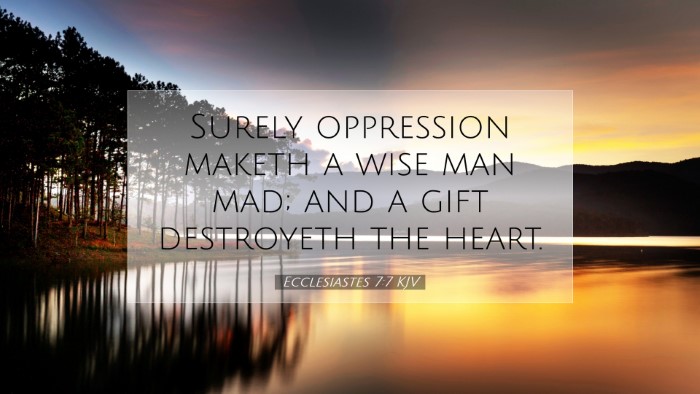Commentary on Ecclesiastes 7:7
Ecclesiastes 7:7 (KJV): "Surely oppression maketh a wise man mad; and a gift destroyeth the heart."
Introduction
The book of Ecclesiastes, attributed to Solomon, often addresses the complexities and futility of human existence. In this particular verse, the author sheds light on the effects of oppression and the corrupting influence of bribes. The complexities of life are explored through profound observations that resonate with the struggles of humanity.
Analysis of the Verse
This verse presents two distinct but related observations about life: the draining effects of oppression and the corruptibility that comes from gifts or bribes.
Oppression
Matthew Henry notes that the wise man, when faced with oppression, may lose his sanity or become overwhelmed by the injustices he witnesses. This reflects the natural response of human beings to injustice. The righteous person, who is aware of the moral order of the universe, finds it maddening when the oppressor seems to prosper while the oppressed suffer.
The Impact of Gifts
Henry also comments on the second part of the verse about gifts or bribes. He highlights that a gift can corrupt the heart, leading to moral decay and compromised ethics. Adam Clarke explains that gifts may lead to partiality and a bias that clouds judgment. This observation serves as a caution against the allure of materialism and the ethical compromises that often accompany financial incentives.
Theological Implications
From a theological standpoint, this verse reflects the tension between justice and mercy in God’s economy. Ecclesiastes frequently contrasts the perceived injustices of life with God's ultimate sovereignty. Pastors and theologians can draw on this verse to investigate how injustices in the world affect human perception of God's justice.
Albert Barnes emphasizes that these observations prompt believers not to become disheartened by the prevalence of injustice and corruption. Instead, they should remember that God’s ultimate judgement is sure and that temporal oppressions will not go unnoticed.
Practical Applications
The insights gleaned from Ecclesiastes 7:7 hold significant implications for modern Christians, especially regarding the ethical dilemmas faced in a complex society.
- Awareness of Injustice: Believers are called to recognize and resist oppression in their communities. Encouragement should be found in the knowledge that God values justice and righteousness.
- Guarding the Heart: The warning against bribery encourages individuals to safeguard their integrity and make decisions based on ethical principles rather than material gain.
- Moral Commitment: The church can play a pivotal role in advocating for justice and providing support to those who are oppressed, echoing God's heart for the disenfranchised.
Conclusion
In summary, Ecclesiastes 7:7 serves both as a poignant reminder of the harsh realities of life and as a call to action for those who seek to live wisely in a complex world. Whether one interprets the verse through a lens of pastoral care, theological reflection, or ethical guidance, it offers rich insights into the human condition. Through the lens of oppression and moral integrity, theologians and scholars can further explore the interplay between divine justice and human experience.


